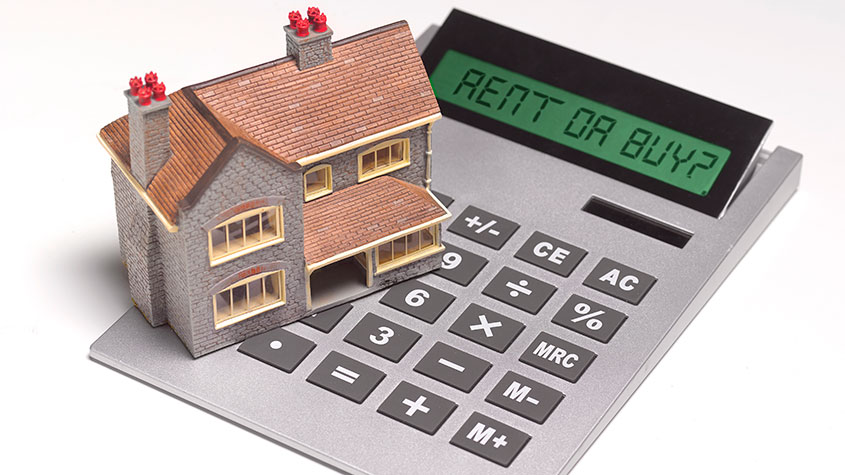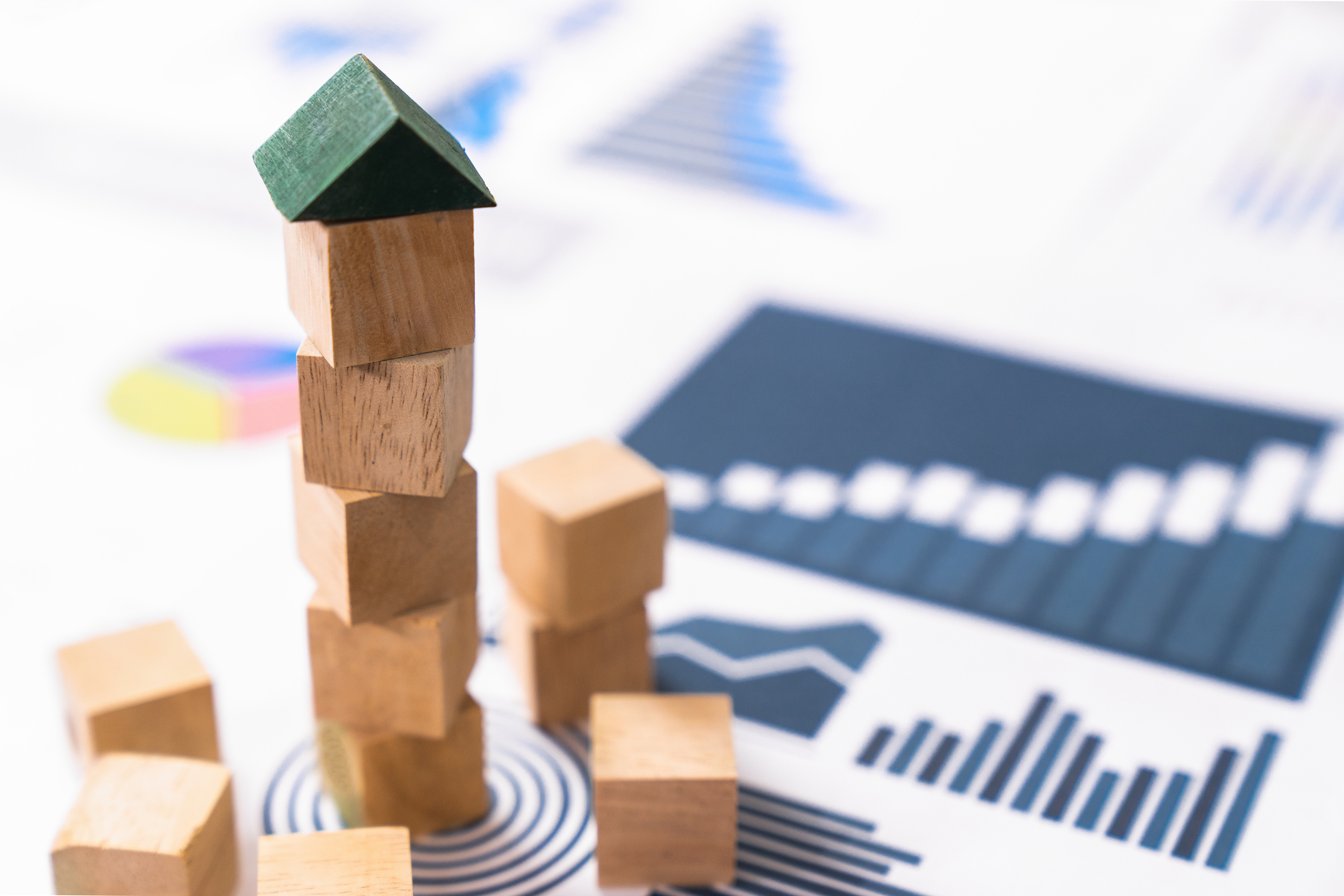Buying vs renting: as mortgage rates drop, which is cheaper?
In the UK, buying a home has traditionally been the preferred option over renting. But is that still true?


Get the latest financial news, insights and expert analysis from our award-winning MoneyWeek team, to help you understand what really matters when it comes to your finances.
You are now subscribed
Your newsletter sign-up was successful
Want to add more newsletters?

Twice daily
MoneyWeek
Get the latest financial news, insights and expert analysis from our award-winning MoneyWeek team, to help you understand what really matters when it comes to your finances.

Four times a week
Look After My Bills
Sign up to our free money-saving newsletter, filled with the latest news and expert advice to help you find the best tips and deals for managing your bills. Start saving today!
Falling mortgage rates have made buying a property cheaper than renting for most people, but much depends on how much you earn and where you want to live.
Average mortgage pricing had shot up last year as the Bank of England hiked rates to tackle soaring inflation, making it a more tricky decision when it came to buying a property as in come cases, renting looked cheaper than paying average rates of 5% or more.
But inflation has slowed for much of 2024, prompting the Bank of England to cut interest rates in August.
MoneyWeek
Subscribe to MoneyWeek today and get your first six magazine issues absolutely FREE

Sign up to Money Morning
Don't miss the latest investment and personal finances news, market analysis, plus money-saving tips with our free twice-daily newsletter
Don't miss the latest investment and personal finances news, market analysis, plus money-saving tips with our free twice-daily newsletter
This coincided with many of the best mortgage rates falling.
The average two-year fixed rate mortgage is now 5.37% or 5.06% for a five-year fix, according to Moneyfacts.
There are now plenty of top deals below 4% from major lenders, which is an improvement on mortgage rates of 4% or 5% that were being offered only a few months ago.
But while this may have boosted buyer budgets, potential purchasers have also been hampered by house prices now rising at the fastest rate for two years.
That influences how much a property buyer can afford and will be willing to offer for a new home, especially with other bills also rising such as energy prices.
In contrast, tenants are being hit by a lack of supply, which is keeping rents high, although growth has been slowing.
Renting vs buying
Renting has traditionally been more expensive than buying a house when you look at monthly accommodation costs.
The gap had closed at the start of 2024, with analysis by Halifax showing that higher mortgage rates had actually made renting cheaper in most UK regions.
Based on its own lending data for a typical first-time buyer three-bed home, Halifax said the monthly cost of renting is now cheaper than what a homeowner would pay each month for an equivalent property.
The difference was largest in the East of England, where renters were an average of £2,325 better off each year. However, owning a first home worked out as being cheaper in the South West, London and Scotland.
| Region | Average monthly mortgage | Average monthly rent |
|---|---|---|
| North East | £827 | £801 |
| Yokrshire & Humber | £954 | £809 |
| North West | £1,030 | £907 |
| East Midlands | £1,081 | £936 |
| West Midlands | £1,118 | £1,056 |
| East of England | £1,546 | £1,353 |
| Wales | £953 | £864 |
| South West | £1,298 | £1,437 |
| South East | £1,705 | £1,551 |
| Greater London | £2,241 | £2,253 |
| Northern Ireland | £779 | £692 |
| Scotland | £953 | £988 |
| UK | £1,231 | £1,258 |
But this has changed since mortgage rates have dropped, while rents have continued to rise.
Analysis by property website Zoopla in June found that at a national level, the average monthly UK rent was £93 per month or 8% more expensive than the average mortgage repayment for a first-time buyer.
This was based on getting a mortgage with a 20% deposit on a 30-year term at an average mortgage rate of 4.6%.
More recent analysis by property data company TwentyCi shows those on typical UK incomes are now better-off buying in most UK regions.
TwentyCi looked at the average employee income by region and analysed where tenants were paying up to 30% - deemed as affordable - or more of their income on rent.
It found that tenants in London on average pay more than 57% of their income on rent.
The analysis suggested that assuming a six times loan-to-income value, a 5% deposit and a 40-year mortgage at 5% interest rates, renters may now be better off buying in the south of the country compared with renting.
The difference is smaller in the North East, where tenants are only paying 28.8% of their income on rent, while the figure is at around 30% in the North West and the Midlands.
| Region | Average annual pay | Median monthly rent | Percentage of gross income spent on rent |
|---|---|---|---|
| UK | £34,963 | £1,250 | 42.9% |
| England | £35,10 | £1,300 | 44.4% |
| North East | £31,200 | £750 | 28.8% |
| North West | £33,036 | £950 | 34.5% |
| Yorkshire | £31,920 | £850 | 32% |
| West Midlands | £33,003 | £950 | 34.5% |
| East Midlands | £31,634 | £895 | 34% |
| East of England | £34,833 | £1,250 | 43.1% |
| London | £44,370 | £2,119 | 57.3% |
| South East | £36,560 | £1,350 | 44,3% |
| South West | £33,450 | £1,150 | 41.3% |
| Wales | £32,371 | £900 | 33.4% |
| Scotland | £35,518 | £950 | 32.1% |
| Northern Ireland | £32,879 | £850 | 31% |
That may sound like good news for renters looking to buy.
But high rents make it hard to save for a deposit for a mortgage and tenants may struggle to meet strict affordability criteria.
So, which is the better choice financially – buying vs renting?
The pros and cons of renting
There are lots of decisions to make when looking at where to live and whether to rent or buy. Some of the positive aspects of renting include the following:
- Flexibility – you can move after as little as six months if the tenancy or area (or a new relationship that you’re ‘testing) doesn’t suit you
- You are not responsible for paying for the general upkeep of the property or fixing things when they go wrong as that will be down to the landlord
- If you rent a furnished property you don’t have to pay for furniture or white goods
- Getting on the rental ladder is theoretically easier than getting on the property ladder - though the increasing competitiveness of the rental market may null this argument
- The rental property’s value isn’t your personal concern
- There are no admin fees charged by landlords and letting agents
The major cons of renting include the following:
- Flexibility is also a disadvantage as much as it is an advantage: The duration of a tenancy agreement is generally decided by the landlord. The decision to increase rent or to sell up is also the landlord’s, leaving tenants with no option but to leave. The average length of a tenancy is two years, according to property website Rightmove. Flexibility in fact all points to a lack of stability. Some of these rules may change with the Renters' Rights Bill, which bans no-fault evictions and in-contract rent rises.
- You won’t have the option of decorating (unless your landlord allows it
- There might be restrictions on what you can do with the property
- There is little enforcement in place to protect renters from rogue landlords or unsafe properties. New legislation going through Parliament under the Renters Reform Bill should give tenants more rights by abolishing ‘no-fault’ section 21 evictions and letting them challenge rent rises.
- You may not be allowed a pet
The pros and cons of owning your own home
The decision to rent or buy will usually come down to the costs involved. The positives of being a property owner include:
- You will own the asset when the mortgage is paid off
- You have more stability than a renter as you won’t have to move out if a landlord decides they want to sell the property
- You can do what you want to the property, within planning regulations
Some of the downsides of owning a home include:
- You’ll have to pay fees such as stamp duty and legal fees
- You’re tied into a long contract; if you’re unable to pay your mortgage your house could be repossessed
- You may need to buy all your own furniture and white goods
- Owning a house can mean a lot of money is tied up within the property and isn’t readily available for other things, such as supporting children through university or even meeting the rising costs of everyday living
- There are even more costs associated with selling such as agency fees.
Is it cheaper to buy or rent?
Data historically shows it is cheaper to buy a home in the long run.
But high mortgage rates compared with previous years, as well as rising house prices, have made the decision less clear-cut for potential owners.
That may change if the cost of borrowing continues to drop in the coming months, with an interest rate cut expected in November.
Buying a house isn’t generally seen as a short-term option though and so you’ll need to weigh up the costs over a longer period.
Mortgages are loans. It’s money you owe to the bank and have to pay back, with interest.
The market isn't necessarily going to get easier for renters though.
The impending Renters' Rights Bill may add extra protection from evictions, but a lack of property supply and landlords exiting the sector means rents are also on the rise - albeit at a slower pace than recent years.
There are risks that tougher renting rules and higher buy-to-let costs could lead landlords to exit – reducing supply – or push up rents further.
Is it worth buying a house?
On the surface, the costs associated with buying a house can seem daunting, but for some, the need to own their own home is visceral and the slog of saving for a number of years to afford it is worth it, especially if you’re planning to stay in the property for many years.
Homeownership also gives you a certain level of financial security. You know how much you have to pay on the mortgage and at the end of the loan term, the home is yours.
Additionally, data shows the market is currently favouring buyers. Zoopla data from September showed 18% of the homes on sale had had to cut their asking prices by 5% or more to attract a buyer.
In contrast, rents can always go up and if you can’t pay, you could be thrown out.
Is renting a waste of money?
There is a prevailing view that renting is a waste of money and that it’s better to be paying your own mortgage rather than hand over your hard earned money to a landlord.
But this ignores the realities of life.
Many people rent because they can’t afford to buy; there are four million households in the social rented sector in England.
Some people rent because they don’t know if they want to take on the responsibilities of home ownership when they’re not certain about where to live – after all, it is a big commitment.
In the short-term, renting can also make more sense financially.
Get the latest financial news, insights and expert analysis from our award-winning MoneyWeek team, to help you understand what really matters when it comes to your finances.

Marc Shoffman is an award-winning freelance journalist specialising in business, personal finance and property. His work has appeared in print and online publications ranging from FT Business to The Times, Mail on Sunday and the i newspaper. He also co-presents the In For A Penny financial planning podcast.
-
 Should you buy an active ETF?
Should you buy an active ETF?ETFs are often mischaracterised as passive products, but they can be a convenient way to add active management to your portfolio
-
 Power up your pension before 5 April – easy ways to save before the tax year end
Power up your pension before 5 April – easy ways to save before the tax year endWith the end of the tax year looming, pension savers currently have a window to review and maximise what’s going into their retirement funds – we look at how
-
 Buying vs renting: is is better to own or rent your home?
Buying vs renting: is is better to own or rent your home?The higher mortgage rates of recent years have actually made renting comparatively cheaper, analysis suggests. But there are hidden costs to long term renting.
-
 Bank of England resolves payments issue that threatened home sales
Bank of England resolves payments issue that threatened home salesNews Homebuyers and sellers faced an anxious wait for funds to clear on property transactions today due to issues hitting the Bank's CHAPS service.
-
 Halifax: House price slump continues as prices slide for the sixth consecutive month
Halifax: House price slump continues as prices slide for the sixth consecutive monthUK house prices fell again in September as buyers returned, but the slowdown was not as fast as anticipated, latest Halifax data shows. Where are house prices falling the most?
-
 Rents hit a record high - but is the opportunity for buy-to-let investors still strong?
Rents hit a record high - but is the opportunity for buy-to-let investors still strong?UK rent prices have hit a record high with the average hitting over £1,200 a month says Rightmove. Are there still opportunities in buy-to-let?
-
 Where to find the best returns from student accommodation
Where to find the best returns from student accommodationStudent accommodation can be a lucrative investment if you know where to look.
-
 Revealed: the cheapest cities to own a home in Britain
Revealed: the cheapest cities to own a home in BritainNew research reveals the cheapest cities to own a home, taking account of mortgage payments, utility bills and council tax
-
 Buy-to-let returns fall 59% amid higher mortgage rates
Buy-to-let returns fall 59% amid higher mortgage ratesBuy-to-let returns are slumping as the cost of borrowing spirals.
-
 North outperforming the South for property investors
North outperforming the South for property investorsThe property market in the North of England is outperforming the South for both capital appreciation and rental yields.